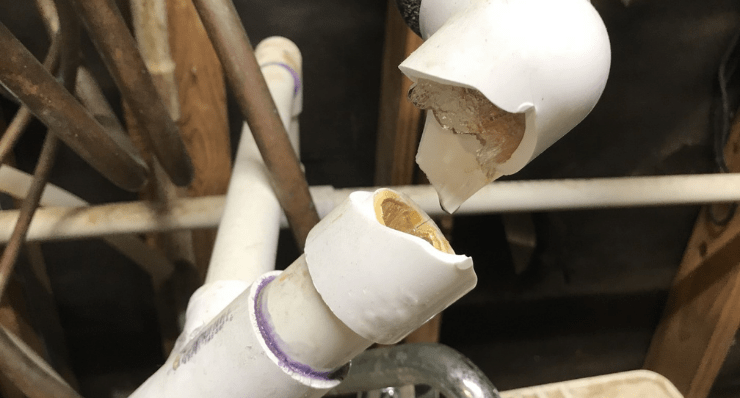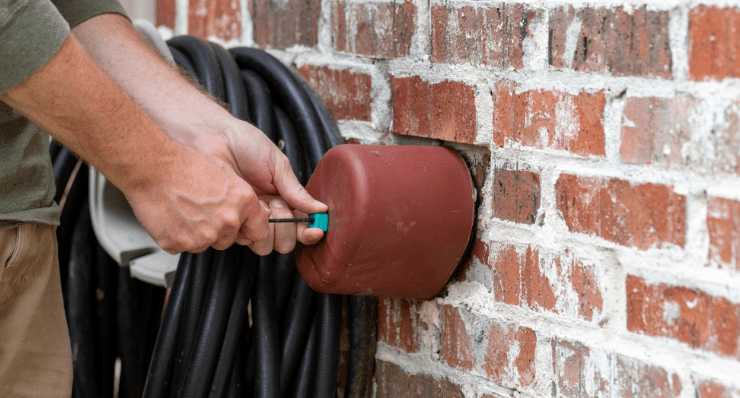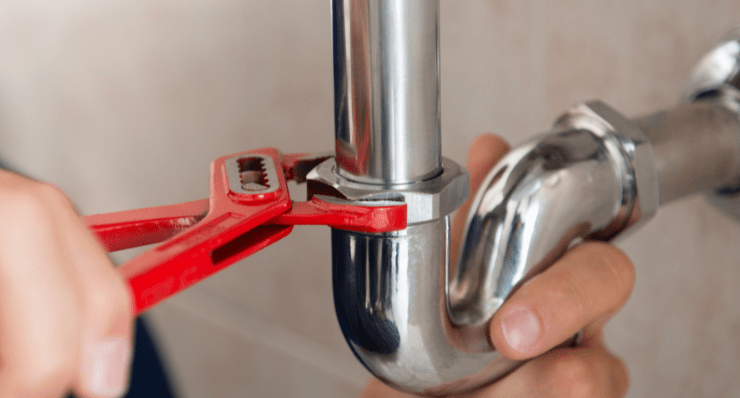.98.png)
Dealing with frozen pipes is certainly not a glamorous task on a homeowner’s list. However, the pending arrival of cold weather highlights a few priorities that every homeowner should address to prevent problems such as frozen pipes and the potential damage and costly repairs.
The impact of frozen pipes on your home can be minimal if preventive efforts are in place ahead of freezing temperatures. Homeowners have a wealth of tips and DIY options to tackle the problem of keeping water flowing freely through the pipes. A recurring theme in the advice for homeowners about how to prevent frozen pipes is to make sure they familiarize themselves with the network of plumbing in their home and to know what it takes to keep the pipes protected when temperatures drop.
Plumbers, homeowner insurance and contractors all weigh in about frozen pipes in an effort to prevent them limit damage and recovering if the situation occurs.
Can pipes freeze in North Carolina?
Although the region generally enjoys mild winters, it is not uncommon for temperatures in North Carolina’s Plateau region to dip close to freezing for a few days. A cold snap in the region can cause pipes to freeze if preventive measures are not taken ahead of time. So the simple answer is yes, pipes can freeze in North Carolina during cold periods.
If your home has exposed pipes, there is a risk of the plumbing system freezing and cutting off access to running water or potentially causing other damage. In addition, there are other pipes that are at risk, especially those along exterior walls, in unheated areas of a home or plumbing for additional features like pools and irrigation systems. All of these pipes are at risk of freezing and should not be overlooked when preparing for cold weather and the impact on your home.
How to find a frozen pipe?
Take a look at the pipes that are visible throughout your home. Are there cracks or other things that may not look right? It may be evidence of a pipe that has frozen previously or is at risk and needs attention.
According to the experts, a frozen pipe can often be detected by the flow of water coming through the faucet. Before turning the handle on all the faucets throughout the home at one time, take a moment to go section by section to assess each one carefully.
It’s not easy locating frozen pipes in a home but good tips help guide the process.
Look for the signs:
-
Low water pressure from a faucet
-
No water flowing
-
Pipes that appear swollen
-
Foul smells
These are just a few of the signs that a pipe may be frozen and will require a thawing process or eventual repair.

Are Frozen pipes an emergency?
Depending on the severity of damage, frozen pipes can undoubtedly present an emergency, especially if there is no access to running water. It’s estimated that the average residential insurance claim totals more than $10,000 resulting from water damage caused by frozen pipes.
Be sure to assess the damage caused by frozen pipes as early as possible to prevent further issues or get a professional on-site quickly. Once you can determine that a pipe may be frozen, there are several options to remedy the problem.
Things to try include:
-
Heating the area around pipes
-
Wrap warm towels around pipes to help thaw
-
Turn off the water if suspect a frozen pipe to prevent leaks after it thawed out
If the temperature begins to warm up in the space and the pipes are warmed up, it could prevent a full-blown emergency and damage. The earlier the fix, the better.
Will frozen pipes burst?
While the risk is high for homeowners to find a burst pipe, it is not always the case. The pressure that builds in the pipe between the water and the ice blocking the flow is key to whether or not the pipe will burst. The vital step is to relieve this pressure by opening the faucet and finding safe ways to let the ice in the pipe thaw out to restore the water flow.
How do you keep frozen pipes from bursting?
Any time the weather forecast includes chances of the drop in the temperature, especially toward freezing, is when homeowners should begin working to protect pipes.
A wide array of tips, like those from the American Red Cross about frozen pipes, are available to help keep them from bursting.
Other tips include:
-
Insulate pipes in areas that are prone to cold temperatures
-
Seal cracks
-
Disconnect outdoor plumbing like pools and irrigation systems
-
Keep the temperature inside the home at a warm, comfortable level
-
Let faucets drip if freezing weather is predicted
The experts advise homeowners to keep cabinet doors open so that pipes can be exposed to heat sources throughout the house. So the kitchen cabinet under the sink or even closet doors with access to the shower plumbing should be open to allow warm air to circulate to help prevent freezing.

What temperature will prevent pipes from freezing?
In general, keeping pipes warm around 55 degrees eliminates the potential of freezing.
Water freezes at 32 degrees so that is the point that is of concern for damage to pipes. The lower the temperature dips, the higher the risk level for pipes freezing especially if they are exposed.
Additional factors contribute to pipes potentially freezing that include:
-
Pipes along exterior walls
-
Exposed pipes
-
Irrigation systems
-
Plumbing for swimming pools
But in some cases, it depends on what part of the country your home is located as to what the pipes can withstand during chilly weather. Some like Restoration Local recommend keeping pipes warmer, over 60 degrees to keep things safe. Keeping the air around pipes warm is an important step to avoid the problem of freezing and having to thaw them out or clean up if a pipe bursts.
Will pouring hot water down the drain unfreeze pipes?
There are a few tricks to try when dealing with frozen pipes. One of them may sound like a myth, but there is some merit to it. Pouring hot water down the drain can help unfreeze the network of pipes and get things working properly. Although it is advised to consult a professional first since pipe networks differ and all frozen spots are not the same, the trick can be done on small sections.
Here is how it’s done:
-
Heat water to almost boiling.
-
Pour hot water slowly down the drain.
-
Check the flow of the pipe.
-
Add more hot water if needed.
-
Avoid using an open flame
Keep a bucket and towels close at hand to clean up any spills if the water backs up. In some cases, towels soaked in hot water and wrapped around the pipe can assist with a strip of heat tape and aid in the process.

How do I prepare my house for freezing temperatures?
Preparing your house for freezing temperatures takes planning how to best protect pipes and other access points. The assortment of tips can be an excellent place to start. But remember, your home is different from another so what may work in one type of home, may not be the case for yours. Please do your homework of sorts, learn your house and what it takes to keep things from freezing up and causing damage.
Tips from the North Carolina Consumers Council include insulating pipes and turning off exterior faucets. The Spruce offers up a list of tips to protect your home during cold weather, ranging from keeping garage doors closed to cleaning gutters and sealing cracks and holes to keep air from getting in or escaping.
Whenever the forecast predicts a drop in temperatures, especially to freezing levels, it is an excellent time to go over your checklist to make sure your house is ready. Although many to-do-lists have similarities, there’s something to glean from several different ones to over much of your house. Today’s Homeowner with Danny Lipford advises additional areas to review during cold weather to keep your house and the network of pipes warm.
-
Fireplace should be inspected and clean
-
Leave faucets open to drip a bit.
-
Keep blinds drawn to keep heat in
-
Replace weather-stripping around doors and windows
-
Fill heating oil tanks
The main thing about protecting your home during cold periods is to plan ahead and be ready to execute your list when the forecast predicts a frost in the air. Turn on a faucet in your home or have several faucets in your home dripping to keep the flow from freezing up and being unable to disburse water. If unable to locate a frozen pipe, and the water line is not flowing, it may be time to call a professional.
Handle frozen water pipes with professional attention
Cold weather always makes it necessary to determine how best to protect your home against the elements, plan for freezing temps and prepare a few snow day essentials too. The process of protecting your home from freezing temperatures means finding all the vulnerable spots and mitigating the issue ahead of time or putting action steps in place in case you need to call a professional plumber to repair damage to water pipes.
Landmark Realty has a wealth of experience to share as they call the region home as well. Trust their professional advice during your home search and gain some valuable tips to ease your anxieties about hurricanes or winter storms. Contact any Landmark real estate broker to discover the great communities in the region, and choose from a condo/townhouse, featured estates or land to build your dream home here in Western North Carolina.
Posted by Landmark Concierge on
Leave A Comment